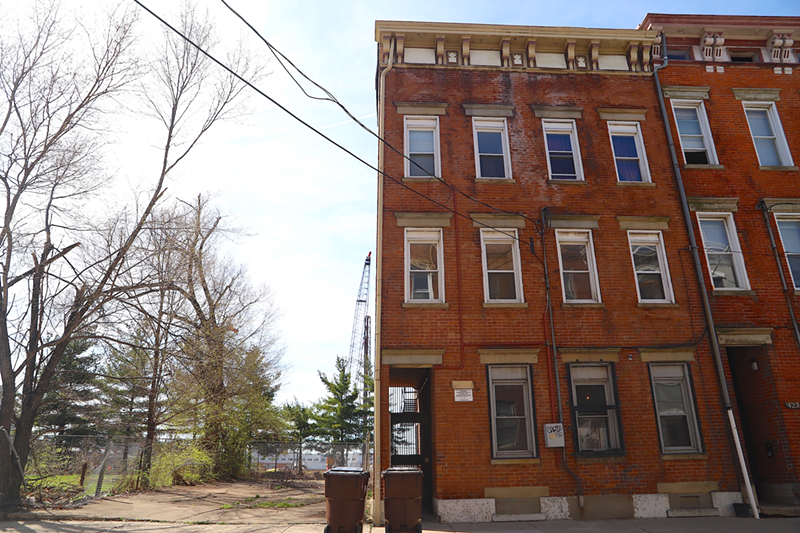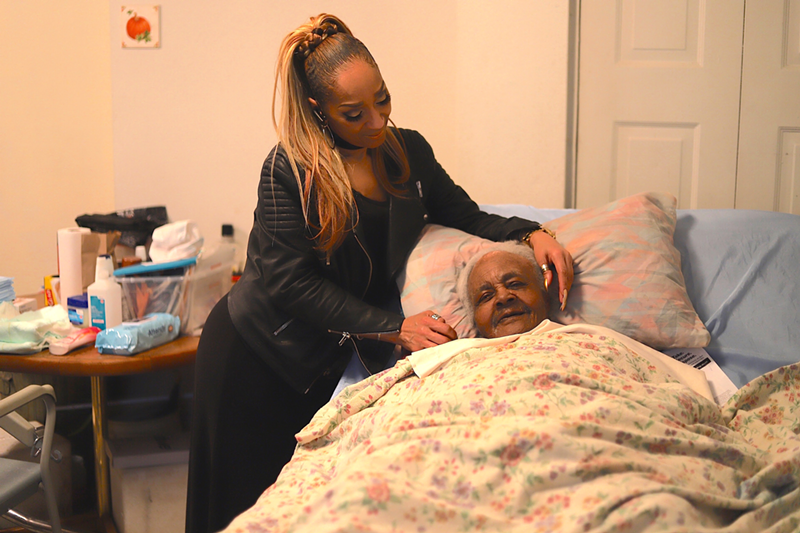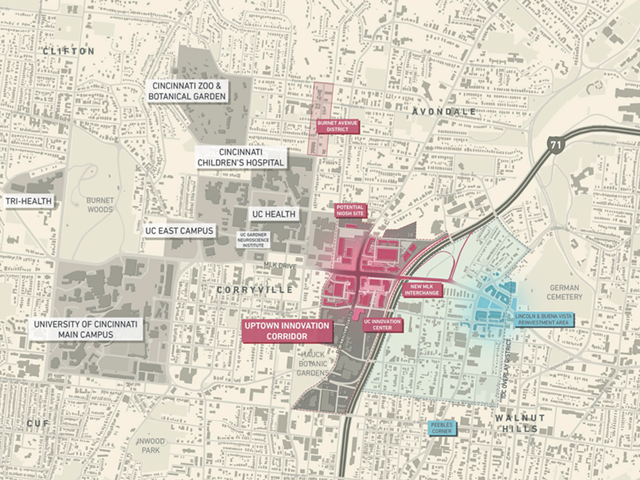
On a quiet stretch of Wade Street just yards north of the coming FC Cincinnati stadium in the West End, the hum and beep of construction equipment mixes with the sounds of birds nestling back into a few bare trees for the spring.
There, in a small apartment on the first floor of a four-story building built in 1883, Mary Frances Page lays among the floral print sheets of her bed as her niece, Kim Dillard, strokes her hair and comforts her.
Page is 99 years old — “I’ll be 100 in February,” she says proudly. City directories show she has lived in her apartment for at least 15 years. Before that, she lived nearby on 14th Street. She’s been in Over-the-Rhine and the West End for decades after moving from Calumet Street in Mount Auburn in the 1980s.
In another month, she will need to be in another apartment, and she and her niece are both very worried about it.
“I love living around here," Page says. "I’ve got friends around me. They bring me dinner, they come and see me.”
Page's impending move is one part of the complex changes coming to the West End — partly as a result of the stadium, but in a bigger sense, rooted in much larger socioeconomic dynamics.
In February, Page got a letter from Historic Limited Liability Company, the entity that once held the building.
“The one constant in life is change,” the letter begins before informing Page that she and other occupants would need to be out by April 30. “We are no longer the owners of this building and the time for leniency has passed. We realize finding a new place to live is a big undertaking, and that is precisely why we are giving you over two months written notice to find a new home. Unfortunately, April will be here before you know it, so please start your search now.”
That’s just what her niece Dillard did, but she says the hunt for a place that will accept Page’s Section 8 voucher that is also accessible — preferably on the first floor — has proven difficult. Page is bedridden due to damage to veins in her legs.
“In her predicament, with her disability and the accommodations that she needs, 70 days isn’t enough time, especially when you’re getting Section 8,” Dillard says.
Through Historic LLC, Fred Berger owned the building and another nearby at 1559 Central Ave. He says he sold both recently because they will be too close to the coming stadium for people to live in.
“I was approached by a couple of people, and it became pretty obvious that the environment is changing entirely so that people can’t continue living there,” he says. “In all honesty, if you kept people living there, if it was even possible, they’d never get any sleep.”
FC Cincinnati General Manager Jeff Berding last year pledged the stadium wouldn't result in displacement as the team made its pitch for building in the West End. A trio of businesses and one resident had to leave the State Theater, which was further south on Central Avenue in the actual footprint of the stadium, but the team has worked to find a new location for at least one of those businesses and contributed relocation expenses to all three in that case.
"The notion that we’re somehow going to try to buy people’s homes out, move people out of the neighborhood, that’s just false," Berding told a WCPO TV anchor in January 2018. "That’s just made up."
FC Cincinnati doesn't comment on property acquisition, a spokesperson for the team said in response to an inquiry from CityBeat.
Berger did not reveal who purchased the Wade Street and Central Avenue properties, but the Hamilton County Auditor’s site lists Wade Street Holdings LLC as the owner of both properties since January 11, 2019 — just days after that LLC was created.
A request for an exemption to property conveyance fees filed with the Hamilton County Auditor Jan. 14 shows that Wade Street Holdings LLC is now registered at 14 East 4th Street, Third Floor — the address of FC Cincinnati's offices.
In the aftermath of the sale, Berger says he has been working on getting everyone resettled, hopefully by placing them in other buildings he owns in the area. He says he’s sympathetic to residents’ situations and wants to be compassionate, noting he gave tenants 70 days instead of the legally required 30-day notice. More than a dozen residents are looking for housing.
“One of the things I wanted to make sure of was that we could accommodate long-term tenants,” he said. “If there’s a good tenant, a long-term tenant, we want to do everything we can for them.”

Seven Hills Neighborhood Houses, a long-running nonprofit in the neighborhood and its community development corporation, says it is also working to help residents of the Wade Street building.
“Seven Hills is assisting in the search for a new home and relocation assistance," said Sarah Thomas, who works with the group. "It is unfortunate to see long-term residents pushed out and facing such uncertainty. The shortage of affordable housing creates a significant barrier and the process is especially difficult for elderly and disabled residents. We will continue to do everything we can to assist residents and business owners facing displacement in the West End.”
As part of the stadium deal, Seven Hills received $176,000 from the sale of city property for eviction prevention programs. Those funds are for residents who face displacement due to rising rents, however, not the potential demolition of buildings.
Two households in 1559 Central Ave. that receive permanent supportive housing through Over-the-Rhine Community Housing have found other homes via the nonprofit, a representative for the group says. There is at least one other household living in the property, however.
Others in the Wade Street building are also still looking for their next home. Gary Shaw, 56, lives across the hall from Page. Born in the West End, Shaw has been in the building for about three years. Prior to that, he was homeless. He has a caseworker, he says, who is helping him try to find another apartment that will take his Section 8 voucher. Like Page, he’d very much like to be on the first floor of a building. He’s had two heart attacks and has limited mobility.
Shaw would also like to stay in the neighborhood, he says. He utilizes help from the Freestore Foodbank, and also shops at nearby Findlay Market.
“Not everybody has a car,” he says. “It’s hard to find Section 8 in the West End.”
Chinessa Hinton, a custodial worker at the University of Cincinnati, has lived upstairs in the Wade Street building for eight years. She too is searching for a new place ahead of the April 30 deadline. She thinks she may have found a spot at the Arts Apartments, about three-quarters of a mile away on Ezzard Charles Drive, but it’s not set in stone yet.
“When you’re trying to do it in a couple months, you have to take what’s available,” she says. “And if you don’t, you’re going to be out. A lot of places, when you call them, they’re not even looking at applications in 30 days. You have to take what you can get right then and there, and sometimes it’ll be a slum, roaches and rats and everything.”
The Arts Apartments have a decent reputation, but the fate of Hinton’s potential new home is also somewhat in question. Its current owners are selling the property, according to a prospectus released late last year that prominently featured the coming stadium.
Prospective buyers Birge & Held have said they’d like to keep the 248-unit affordable, but are awaiting key approvals from HUD that would allow it to maintain the building’s housing subsidy contracts.
“I know the city is concerned with the new stadium coming," Birge & Held’s Tallal Shakarchi told residents at a recent tenants’ meeting. "As an affordable developer, when the property went up for sale, we were the only ones left trying to keep it affordable, rent restricted, at the end. The other purchasers, their plans were different than ours."
Berger admits the relocation process has been a challenge for residents at times, though he says some have already found new places and he’s working on getting more of his units ready for new tenants.
“The market is tight right now for Section 8 people,” he says.
That’s true in many places across the city, which has a roughly 27,000-unit gap in housing that is affordable to its lowest-income residents, according to statistics presented by the Ohio Housing Finance Agency to Cincinnati City Council last year.
That gap most severely affects those making about 30 percent of Hamilton County’s area median income — a level that roughly matches West End residents’ $15,000 a year median income. At that level, an affordable apartment would cost about $400 a month.
The West End has about 1,400 units of subsidized housing run by CMHA, utilizing HUD subsidies like Section 8 or cost-restricted because they were built with Low Income Housing Tax Credits. But more than half of the neighborhood’s 6,000 residents are below the poverty line and another 1,300 live above poverty level but still well below the income needed to comfortably afford the city's median rent, which has hovered around $900 a month in recent months.
As part of a community benefits agreement between FC Cincinnati and some neighborhood representatives, the team will pay $100,000 for a housing study overseen by the Port of Greater Cincinnati Redevelopment Authority, a financing partner in the soccer facility.
Like the residents of the buildings on Wade Street and on Central Avenue, 84 percent of West End residents rent, rather than own, their homes. That status as renters could make many vulnerable as interest in the West End ramps up, some housing advocates fear.
The coming soccer stadium has stoked fears of displacement and rising rents in the West End, which previously saw decades of disinvestment. But even before the long, tumultuous process that brought the stadium here, those looking for urban living or the next investment opportunity were checking out the neighborhood.
That has brought new money, more buildings purchased and more rehabbing efforts — though whether all that new investment will benefit residents is an open question.
In 2012, there were 16 home improvement or mortgage loans written in the three full Census tracts that make up the West End, according to federal data. In a neighborhood that is 85 percent black with a median household income of about $15,000 a year, the $2,124,000 in loans went to applicants with a median income of $58,000 a year. Only three of the recipients were black.
By 2017, the last year for which federal data is available, there were 41 such loans worth $5,554,000 sold to applicants with a median income of $80,000 a year. Thirteen of the recipients of those loans — about 30 percent — were black.
Meanwhile, funding for new affordable housing projects in the West End has lagged. The neighborhood’s last allocation of Low Income Housing Tax Credits — which fund the development of much of America’s low-income, non-Section 8 housing — was $972,000 for the Sands Senior Apartments in 2014.
Across the street from Page, Shaw and Hinton’s building, real estate investors will eventually devote roughly $4 million into an effort started in 2014 to convert five formerly-vacant buildings on Wade Street — once part of the neighborhood's 22 percent vacancy rate as measured by the U.S. Census — into 22 condos called Kuhfers Flats. Those condos will range between about $220,000 and $300,000 a unit when finished.
Those units will bring more housing online. But they won't be in reach for those who live across the street.
Page is emotional about the prospect of the coming changes. She returns time and again to talking about her neighbors, saying they don’t have the money or time for the move.
As she lays in bed, a few tears run down her cheek.
“I don’t want you worrying,” Dillard says, rubbing her aunt’s legs and pointing to a picture of Jesus on the wall. “Look up there. It’s OK, right?”
“He’s taking care of me,” Page says.
Across the hall, sitting on his couch in his apartment with his eyes shaded by his bent-bill baseball cap, Shaw says he begrudgingly accepts the changes coming.
“If I’ve gotta go, I’ve gotta go,” he says. “It’s not my building. I don’t have money for a townhouse, man. I don’t know. It’s just business, I guess. It’s just messing me up because I don’t have money to buy a building.”
UPDATE April 3: This story has been updated to include documents showing that FC Cincinnati purchased 421 Wade Street and 1559 Central Ave. through an LLC transfer.




